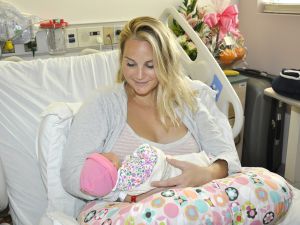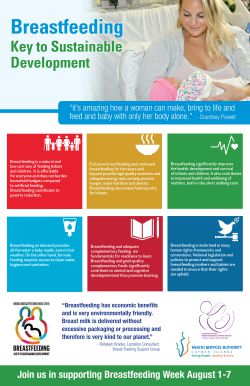
Courtney Powell, with daughter Charlotte, appears on one of the posters promoting World Breastfeeding Week (below)
(CNS): This year’s World Breastfeeding Week focuses on how nursing mothers can play a part in achieving the United Nations 17 Sustainable Development Goals (SDGs) which are a blueprint for global commitment and action towards equitable development. The annual celebration, which takes place 1-7 August 2016, will serve as the foundation to raise awareness of these goals through the theme, “Breastfeeding: A Key to Sustainable Development”.
Governments around the world have agreed to accomplish these goals by 2030.
According to the World Alliance for Breastfeeding Action (WABA), “The World Breastfeeding Week 2016 theme is about how breastfeeding is a key element in getting us to think about how to value our wellbeing from the start of life, how to respect each other and care for the world we share.”
This year WABA identified ways in which breastfeeding can contribute to each sustainable development goal, saying that breastfeeding can help to reduce poverty; is a means of food security for infants; provides high quality nutrients and adequate energy; and helps prevent hunger, undernutrition and obesity.
The UK medical journal, Lancet, presented new evidence that confirms optimal breastfeeding could save 823,000 children and add $302 billion to the global economy annually.
To highlight the importance of this week and its theme the Cayman Islands will be engaging in several breastfeeding week activities. There will be posters displayed throughout various locations in the Cayman Islands Hospital, Women’s Health, all district health centres, Cayman Brac, private antenatal and postnatal clinics, the Family Resource Centre and private pediatric clinics. In addition to running a public-information campaign, sippy cups with a breastfeeding message will be provided for all mothers delivering babies on the maternity ward at the Cayman Islands Hospital.
 The Cayman Islands Breastfeeding Support Group will be hosting an event to promote and discuss breastfeeding in public and related topics at Bedside Manor in Camana Bay on Friday, 5 August at 3:00pm. “The current recommendations are to exclusively breastfeed for the first six months of your baby’s life, followed by breastfeeding with healthy complementary foods up to two years of age or beyond,” said Rebekah Brooks, lactation consultant of the breastfeeding support group and international representative for Baptist Health International.
The Cayman Islands Breastfeeding Support Group will be hosting an event to promote and discuss breastfeeding in public and related topics at Bedside Manor in Camana Bay on Friday, 5 August at 3:00pm. “The current recommendations are to exclusively breastfeed for the first six months of your baby’s life, followed by breastfeeding with healthy complementary foods up to two years of age or beyond,” said Rebekah Brooks, lactation consultant of the breastfeeding support group and international representative for Baptist Health International.
Despite the positive health benefits breastfeeding offers both baby and mother, global breastfeeding rates have remained stagnant for the past two decades. Fewer than 40% of infants under six months of age are exclusively breastfed.
“There are no costs incurred by breastfeeding as opposed to purchasing artificial baby milks and the medical expenses are often less as generally, breastfed babies are less likely to need medical attention,” Brooks said.
“Breast milk is perfectly designed for babies and is available whenever a baby needs it. The benefits of breastfeeding extend well beyond basic nutrition. For the babies, breastfeeding reduces the risk of infections, diarrhea and vomiting, Sudden Infant Death Syndrome (SIDS), childhood leukemia, Type 2 diabetes, obesity and cardiovascular disease in adulthood.
“For the mothers, breastfeeding lowers your risk of breast cancer, ovarian cancer, osteoporosis (weak bones), cardiovascular disease and obesity.”
Simone Sheehan, Health Services Authority (HSA) dietitian, said that breastfeeding not only significantly improves the health of infants and young children, but also improves mental and cognitive development and so promotes learning.
“Breastfeeding is a great equaliser giving every child a fair and best start to life. The experience can also be satisfying and empowering for the mother,” she said.
“Breastfeeding also has economic benefits and is very environmentally friendly.”
According to WABA, breastfeeding requires less energy when compared to formula production industries; reduces the need for water and fossil fuels in the home; provides all the water a baby needs while formula feeding requires access to clean water; safeguards infant health and nutrition in times of adversity and weather-related natural disasters due to global warming; is more ecological than formula feeding production which puts pressure on natural resources and contributes to carbon emissions and climate change.
Since breastfeeding is enshrined in many human rights frameworks and conventions WABA highlighted the need for promotion of national legislation and policies to defend and support the rights of breastfeeding mothers.
“I advise every new mother to consider trying to breastfeed it is a fantastic experience and gives your baby a great start to life,” added Annette O Brien, midwife of the HSA maternity unit.

